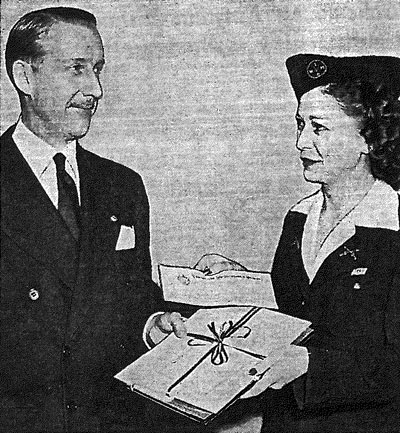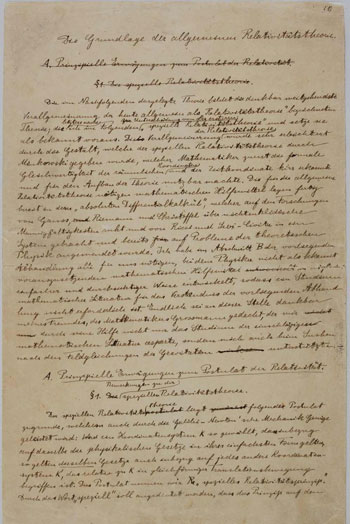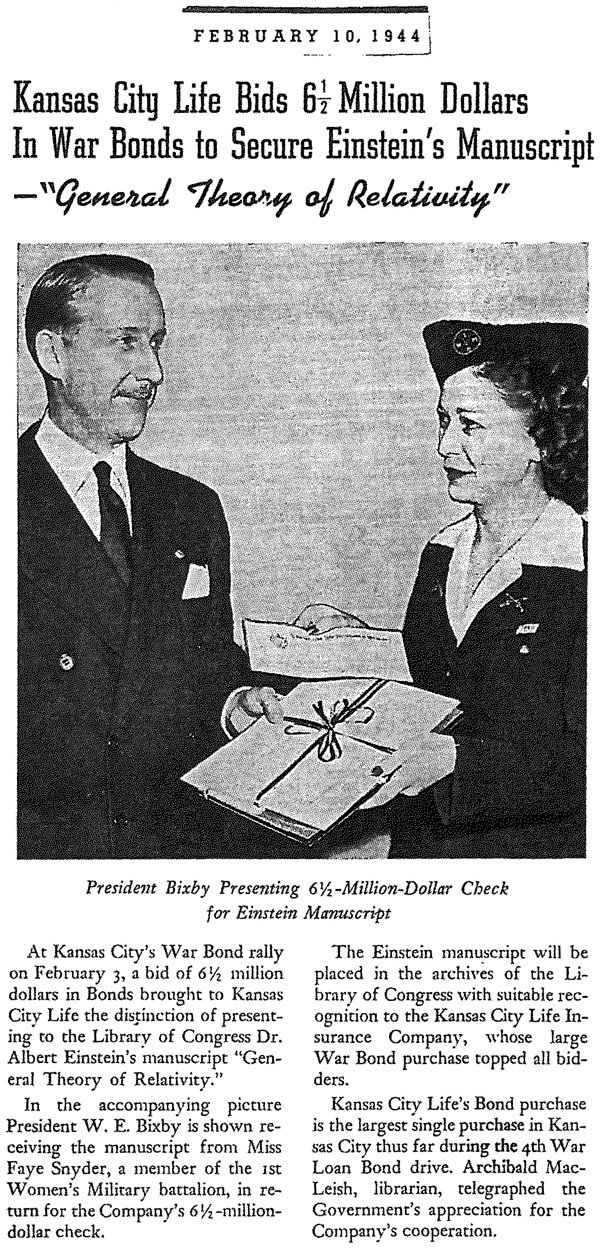
A February 1944 newspaper clipping shows Kansas City Life Insurance Company President Walter Bixby exchanging a $6.5 million check for the manuscript of Einstein’s Theory of Relativity.
As scientists and science geeks across the world celebrate the centennial anniversary of Albert Einstein’s Theory of Relativity, a Midtown Kansas City company plays an interesting role in the story.
In a 1944 newspaper photo, Kansas City Life Insurance President Walter Bixby is seen handing over a check of $6.5 million. And in return, a woman in a military uniform hands him a manuscript of the theory penned by Einstein himself.
“During the throes of World War II, fundraising efforts were made through the sale of war bonds. Kansas City Life paid $6.5 million to purchase the Einstein manuscript and donated it to the Library of Congress,” Walter E. Bixby.
The story begins in 1944, during World War II, at a time when Kansas Citians and Americans across the country were doing their patriotic part by contributing to the war bond effort. As part of the Treasury Department’s Fourth War Bond Drive, the Kansas City Women’s Club sponsored a special event.
The women’s group offered a Book and Author War Bond program at the Kansas City Music Hall. It featured radio personality Clifton Fadiman, host of the popular quiz show Information, Please! auctioning off works of well-known writers. The women had somehow gathered an unpublished manuscript on the life of Wild Bill Hickok, a map of the United States drawn in 1719, and a hand written letter from Mark Twain.
The most valuable works they had for auction, however, were “two Einstein manuscripts, so weighted with value that they are to be preserved for future generations in the Library of Congress,” the Kansas City Star reported on Jan. 30, 1944.
 The Jewish Einstein came to the United States in 1933 when Hilter came to power and did not return to Germany. He became an American citizen in 1940. He had already contributed a manuscript to the Library of Congress in gratitude, and decided to contribute to the war bond effort by donating two more.
The Jewish Einstein came to the United States in 1933 when Hilter came to power and did not return to Germany. He became an American citizen in 1940. He had already contributed a manuscript to the Library of Congress in gratitude, and decided to contribute to the war bond effort by donating two more.
One was an unpublished paper; the other was a copy of Einstein’s famous 1905 paper on the General Theory of Relativity which had raised a stir when published and been much discussed for many years.
“The following pages are a copy of my first paper concerning the theory of relativity. I made this copy in November 1943. The original manuscript no longer exists having been discarded by me after its publication,” Einstein said of the manuscript.
Since the original copy had been destroyed after publication, Einstein rewrote it by hand in order to help with the war bond sale. Bixby says he doesn’t know how the Kansas City Women’s Club came to have the documents, but it was reported at the time that the National Refugee Service helped arrange the deal.
In order to get in on the auction, Kansas Citians had to buy war bonds, and those who bought the most bonds were awarded prime seats in the Music Hall. Students from Northwest Junior High and High School were first in the door, as they had beat out other students citywide in war bond purchases.
Kansas City Life Insurance, established in 1895, had moved to its current Midtown location at 3520 Broadway in 1922. As a major war bond purchaser, Bixby’s grandfather and namesake Walter E. Bixby Senior attended the auction on behalf of his company. And Bixby bought the General Theory of Relativity manuscript for $6.5 million.
W.T. Kemper bought the other Einstein manuscript, and Kansas City gained the distinction of being the first city in its population class to exceed its quota in the Fourth War Bonds campaign,” the Associated Press reported on Feb. 4, 1944.
The documents stayed on public view in Kansas City for a month. Since then, the manuscript has been at the Library of Congress, where it is displayed with credit for its acquisition given to Kansas City Life.
Bixby says he doesn’t know of any connection between Kansas City Life Insurance and the Einstein manuscript.
“It was something we wanted to protect, he says. “Its an important document to the history of mankind.”




Who’s talking